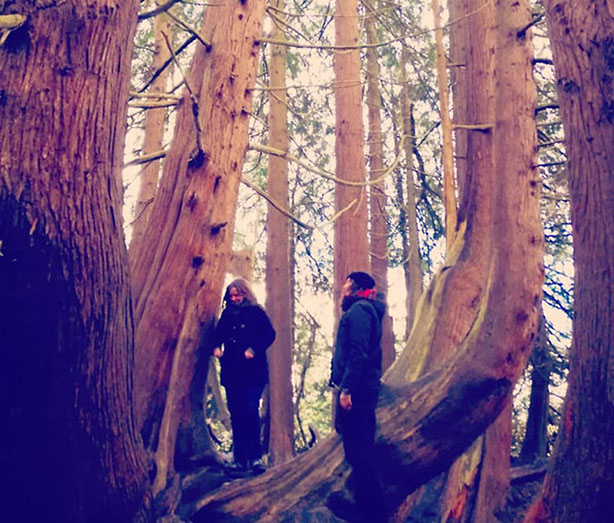If day trip destinations and social media posts are accepted as a metric, most Irish people view forests as a good thing. But excepting the few lucky enough to live beside one, they are largely a box to tick on the summer to-do list. While beloved for their soul-refreshing qualities, much of the population does not have an everyday relationship with them. This is not surprising, given that government mismanagement has made the arboreal a remote presence. Ireland has the least woodland of any country in Europe, a miserable 11% coverage compared to an European average over 40%.
Such disheartening information adds an urgent tone to an otherwise elegant collaboration between Eimear Reidy and Natalia Beylis. Whose Woods These Are contains three lengthy works featuring Reidy’s cello and Beylis’s keyboard work, austere in instrumentation but high in technique, chemistry and mood. As hinted by the Robert Frost-derived title the two have crafted a dedication to the forest and a plea for all to be granted a hand in its conservation. This is a continuing theme for Beylis, whose previous releases have displayed an appreciation of nature bolstered by the reality of her own rural life.
The duo introduce the album with Beylis’s authoritative piano ostinatos, providing a base for Reidy’s cello to wander skyward. ‘The Sloes Made Sweet’ is a loose, oaken song, blooming from simple beginnings to technical complexity, exhibited by a Reidy solo that moves from longer bowing to rapid notes that are melodic but tinged with dissonance. When Beylis’s piano reappears, it is on equal terms with the cello, each player responding to small developments made by the other and developing the song in spiralling progressions. It is another fine argument for the existence of ESP in musicians.
The forest’s background presence is made more explicit in ‘They Rustle and Blink in the Hawthorn’ with the weaving of birdsong into the mix alongside Beylis’s electronic stings. While it is common in nature themed music to paste on a recording for the sake of ambience, here it is integrated into the piece as each musician responds to its melody. Beylis’s electronics are initially jarring, their timbre ill-fitting the mood built by the album to this point, but they begin to settle into the composition as it proceeds and, as the best synthesisers are wont to do, sound as natural as the chirping by the time it concludes. Reidy’s cello playing peaks in this song, answering the birdsong with the same sensitivity as she displays with her fellow player. She achieves this using a variety of techniques, rhythms and dynamic changes that follow the animal’s own battery of sounds, occasionally running down to the lower register as if to anchor the song to the ground.
‘A Shelter of Junipers’ sounds like an elegy to a woodland already levelled, manifested in droning organ and mournful cello work. As it maintains the exquisite standard of the previous songs, it is a sombre conclusion, especially following the abundant signs of natural life displayed before. Since this release aims to draw attention to the potential plight of the forest, it is appropriate to leave the listener contemplating a disastrous “what if?”
Woodlands have long fascinated artists as representations of triumphant nature, stores of the organic. In recent times, they have appeared as prominent tropes in musical styles defined by romanticism like indie folk or second wave black metal. Eimear Reidy and Natalia Beylis join them with this fine paean, which replaces idealistic snapshots with an urgent message of conservation. There is much pleading fire within its spartan construction and, without words, it makes a strong case for considering the forest more than a temporary repository for timber. Pádraic Grant





